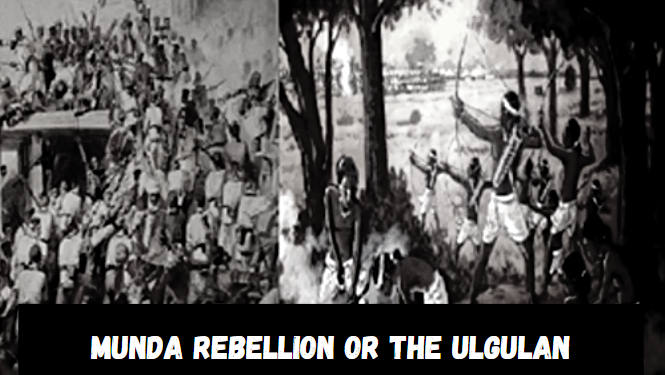Munda Rebellion is a part of several tribal revolts or tribal uprisings that were occurred in the times of British rule in India. Munda Revolt is also known as Ulgulan or the Great Tumult. It was one of the most prominent tribal rebellion of the nineteenth century. The British policy of suppression towards the Indian people for a long time led to severe living conditions and struggle for the general populace of this country. In response to it people rebelled against the British Authority and tried to overthrow them.
इस पोस्ट को हिंदी में पढ़ने के लिए यहाँ क्लिक करें
Munda Revolt or (birsa munda rebellion) was one such initiative by a Man known as Birsa Munda. In this article we will discuss the Munda Rebellion in detail that will help you solve questions on munda rebellion upsc, bpsc, uppsc and in other such examinations.

Munda Rebellion Important Points
| Name of the Movement | Munda Rebellion or Birsa Munda Rebellion, Munda Revolt or, Munda Movement |
| Also Known as | Ulgulan or the Great Tumult |
| Led By | Birsa Munda |
| Area of the Revolt | Chhotanagpur Region or South of Ranchi |
| Revolt Started | 1899 |
| Revolt Ended | 1900 |
| Type of Movement | Revivalist Movement |
| Subject | Indian Freedom Struggle, History |
Munda Rebellion At a Glance
The Munda rebellion is a result of suppressive British Policies towards the people of the region and exploitation of the tribals by the Zamindars, Thikedars, and Moneylenders and manipulation of them by the Missionaries. Mundas were mainly employed in agriculture and practiced the Khuntkatti system i.e. collective ownership of the lands available.
However, with time new settlements were established and outsiders began to settle in the Mundas’ region and they became Jagirdars and Zamindars. Their dealing with the Mundas was exploitative and with time the tribals were reduced to landless laborers. Moneylenders also began charging Mundas high-interest rates that were difficult for them to pay.
Due to the above circumstances, Mundas came into conflict with these outsiders whom they termed the Dikus. The conditions of the Mundas became worse and they were stripped of their ancestral land. They were held completely at the mercy of the Dikus. Also, the attempts at the religious conversion of Mundas by the missionaries also impacted the cultural aspect of the Munda society.
Therefore, the above struggle and distress of the Mundas must bring a revolution or a rebellion and demand to revive the Munda Raj and their rights. This resulted in Mundas finding their leadership in Birsa who was also considered by them as their spiritual leader.
About Birsa Munda

Birsa was born in the year 1875 in Chalkand Village of Ranchi, present Jharkhand. His father was a sharecropper in the region. Birsa was an educated person who knows the English language and the tenets of Christianity. He became a knowledgeable person within the tribe and provided the tribals with an idea of ethical conduct, one god, and the establishment of an ideal and peaceful society. The tribals were concerned about the changing times and its impact on their culture. They found refuge in their spiritual master Birsa. Birsa asked them to pray Sing Bonga or one god rather than praying to many Bonga.
Birsa assured his followers that by praying Sing Bonga the Mundas can regain their ideal state and can become free of exploitation and harassment. He called upon the Mudas to fight against superstition, stop taking intoxicants, give up animal sacrifice, wear the sacred thread, and retain the tribal tradition of worship. Birsa was also called Dharti Aaba by his followers.
Birsa advised his followers not to pay taxes (Lagaan) to the Britishers. His teachings attracted many followers and the movement got expanded. This created apprehensions between the Britishers and Birsa was arrested by the Government on August 24, 1895.
Due to the arrest of Birsa and some of his followers, the momentum of the movement slowed down. Later, on the occasion of Hirak Anniversary of the Queen, Birsa was released from jail in 1898. After coming out of jail at the start of 1899, Birsa started campaigning from village to village. He prepared people to fight against British rule.
Followers of Birsa raided European offices. In some places like Ranchi, Tamar, and Khunti the movement became violent. The movement became widespread. Birsa was again arrested by the authorities on February 3, 1900. In May of the same year, Birsa died due to cholera. Later, his followers were also nabbed by the Government.
The Movement Ended
The movement was ultimately suppressed. However, it was a proactive step by the Mundas against social disparity, economic exploitation, and the foreign rule. It was a revivalist movement. It advocated the Munda society to get rid of the foreign element and regain its purest form. The Munda revolt became an inspiration for future movements and demonstrated that the tribal people were able to vent their outrage at colonial power and can protest against injustice.
Munda Revolt Aftermath
After the suppression of the revolt, the Britishers also realized that they can’t afford to provoke the Mundas and made some changes in the existing system which are given as follows:
- The Chotanagpur Tenancy Act, 1908 was implemented by the British. It placed limitations on the sale of tribal land to non-tribal persons.
- The “Beth begari” was outlawed and the Mundas’ “Khuntkatti” rights were recognized.
Munda Revolt Legacy
- Birth anniversary of Birsa Munda is observed on November 15th, every year.
- The state of Jharkhand came into being on 15 November 2000. The year 2000 was the anniversary year of Birsa Munda.
FAQ Munda Rebellion
Where was Munda Rebellion Started?
Munda Rebellion was started in the ChhotaNagpur plateau south of Ranchi district present Jharkhand.
Who was Munda Rebellion Leader?
Munda Rebellion Leader was Birsa Munda also called as Dharti Aaba by his followers.
When did Munda Revolt Started?
Munda Rebellion started in 1899, due to the suppression of the Mundas by Zamindars and Thikedars and ultimately by long-term suppression of the colonial rule.
When was Birsa Munda Born?
Birsa Munda was born in 1875.
What is the other name of the Munda revolt?
The other names of the Munda revolt are Munda Ulgulan or The Great Tumult.

